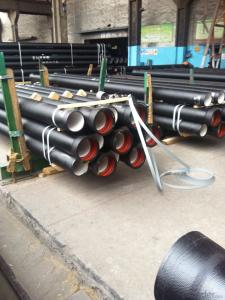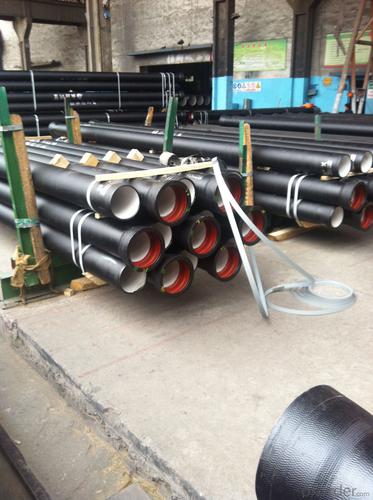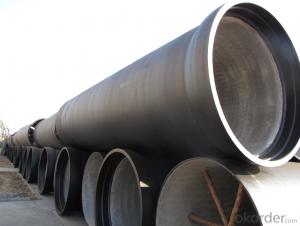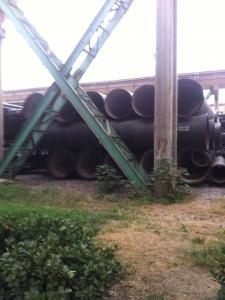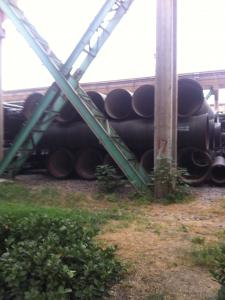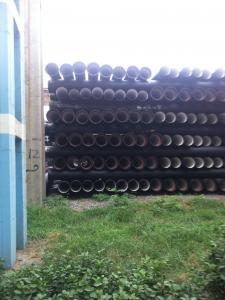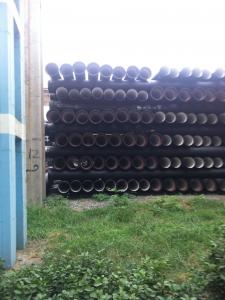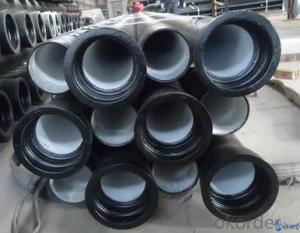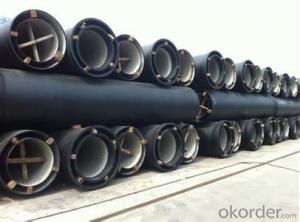DUCTILE IRON PIPES AND PIPE FITTINGS K9 CLASS DN200
- Loading Port:
- Tianjin
- Payment Terms:
- TT OR LC
- Min Order Qty:
- 22 pc
- Supply Capability:
- 3000 pc/month
OKorder Service Pledge
OKorder Financial Service
You Might Also Like
Material : Ductile Cast Iron
Size Range : DN 80mm to DN 2000mm
Unit Effective Length : 6m or 5.7m
Manufacture Standard: ISO 2531:1998/ EN 545:2006/EN 598:2007
Annual capacity : 200,000 tons
Coating Exterior: Zinc 130g/m2 according to ISO 8179-1 and bitumen coating 70 microns.
Cement Interior: Portland Cement/ High Alumina Cement/ Sulphate Resisting Cement Lining according to ISO 4179
Special requirements on external coating and internal lining can be applied
We also provide accessories such as SBR/EPDM rubber gaskets, lubricant paste, pipe caps, PE sleeves, etc.
Additional Parts:
Each pipe is strictly inspected according to related standard to ensure permanently high performance.
Easy Installation at site and service free for life
Long Service Lifespan
Quotation will arrive you within 24hours once we get your inquiry.
We guarantee offering you a competitive price.
A copy of original inspection reports of pipes will be offered after shipment.
Photos of loading process will be sent to the customer after shipment effect.
We will follow-up the delivery progress after shipment effect and update to the customer on weekly basis.
- Q: What is cast iron pipe, specification for cast iron pipe?
- A cast pipe made of cast iron. Cast iron pipes are used for water supply, drainage and gas transmission lines. They include cast iron pipes and pipe fittings.
- Q: How are ductile iron pipes protected against abrasion or wear?
- Ductile iron pipes are protected against abrasion or wear through various methods, including external coatings and linings. These protective measures serve to create a barrier between the pipe's surface and any potential abrasive materials or fluids it may come into contact with. Additionally, the use of sacrificial anodes and cathodic protection systems can also help prevent corrosion and extend the lifespan of the pipes.
- Q: What is the expected buoyancy of ductile iron pipes?
- The expected buoyancy of ductile iron pipes is minimal due to their high density and weight.
- Q: Can ductile iron pipes be used in areas with high soil settlement?
- Ductile iron pipes are suitable for areas with high soil settlement due to their strength and durability. They can withstand external loads and ground movement, making them an ideal choice for such areas. Additionally, these pipes have a high resistance to corrosion, making them even more suitable for use in areas with high soil settlement. However, it is important to consider factors such as proper installation techniques, appropriate bedding and backfill materials, and regular maintenance to ensure the longevity and performance of the ductile iron pipes in these areas. Consulting with a qualified engineer or pipe manufacturer can provide more specific guidance based on the site's conditions and requirements.
- Q: Are ductile iron pipes recyclable?
- Yes, ductile iron pipes are recyclable. Ductile iron is a type of cast iron that has superior strength and durability, making it an excellent choice for various applications, including water and sewage systems. When these pipes reach the end of their lifespan, they can be recycled and reused. The recycling process involves melting down the ductile iron pipes and using the molten metal to produce new pipes or other iron-based products. Recycling ductile iron pipes not only helps to conserve natural resources but also reduces the amount of waste that goes into landfills. Therefore, ductile iron pipes are considered a sustainable and environmentally friendly option for piping systems.
- Q: How can the connection of ductile iron pipe elbow be convenient for connecting?
- The groove connecting pipe consists of two categories of products: sealing function of pipe connections with rigid joint, flexible joint, mechanical three and groove flange; the pipe connections transition of elbow, three links, four links, different diameter pipe, blind plate etc..
- Q: Ductile iron pipe connection mode
- Jack painted on the outer surface and rubber lubricant: lubricant evenly installed ring inner surface, outer surface coating in the socket to socket socket parts lubricant line all the brush in the socket.
- Q: Can ductile iron pipe be used for agricultural irrigation systems?
- Yes, ductile iron pipe can be used for agricultural irrigation systems. Ductile iron pipe is known for its strength, durability, and corrosion resistance, making it suitable for various applications including agricultural irrigation. It can withstand high pressure and provide a reliable and long-lasting solution for transporting water in irrigation systems. Additionally, ductile iron pipe is resistant to chemicals commonly found in water sources used for irrigation, ensuring the pipe's integrity and preventing degradation over time. Its flexibility allows for easy installation and maintenance, making it a practical choice for agricultural irrigation systems.
- Q: How much is the installation cost of the ductile iron tube?
- Ductile iron pipes mainly called centrifugal ductile iron pipe, it has the properties of nature, iron and steel, excellent corrosion resistance, good ductility, good sealing effect, simple installation, mainly for municipal, industrial and mining enterprises, water supply, gas, oil etc..
- Q: Are ductile iron pipes resistant to environmental stress cracking?
- Indeed, environmental stress cracking is not a concern for ductile iron pipes. Ductile iron, a form of cast iron that has been infused with small amounts of magnesium for enhanced strength and ductility, possesses this advantageous quality. Consequently, these pipes exhibit exceptional resistance to cracking and harm caused by environmental stress factors like temperature fluctuations, soil shifting, and corrosive elements present in the surrounding environment. Moreover, the inherent robustness and adaptability of ductile iron enable it to endure substantial external pressure and stress without succumbing to cracking or failure. Ultimately, ductile iron pipes are a dependable and long-lasting option for various purposes, such as the transportation of water and wastewater, thanks to their ability to withstand environmental stress cracking.
Send your message to us
DUCTILE IRON PIPES AND PIPE FITTINGS K9 CLASS DN200
- Loading Port:
- Tianjin
- Payment Terms:
- TT OR LC
- Min Order Qty:
- 22 pc
- Supply Capability:
- 3000 pc/month
OKorder Service Pledge
OKorder Financial Service
Similar products
Hot products
Hot Searches
Related keywords
